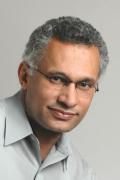结构工程与防灾研究所
Research Institute of Structural Engineering and Disaster Reduction
土木工程防灾国家重点实验室振动台试验室
State Key Laboratory of Disaster Reduction in Civil Engineering
地震工程国际合作联合实验室
International Joint Laboratory of Earthquake Engineering (ILEE)
HIGH-END EXPERT OF TONGJI UNIVERSITY LECTURE SERIES 2015-2
Probabilistic Performance-based Earthquake Engineering
Presenter:

Khalid M. Mosalam, Ph.D., P.Eng
Taisei Professor of Civil Engineering
Program Leader, Structural Eng., Mechanics & Materials
Department of Civil and Environmental Engineering
Director, Pacific Earthquake Engineering Research (PEER) Center
University of California, Berkeley, USA
| No. | Title | Time | Venue |
| S1 | PBEE Assessment Methods | 9:00-12:00 Thu, Dec. 17th | Room 201, Seismic Building 抗震楼B201室 (大礼堂后振动台试验室) |
| S2 | PBEE Design Methods | 13:30-16:30 Thu, Dec. 17th | Room 201, Seismic Building 抗震楼B201室 (大礼堂后振动台试验室) |
| S3 | PEER PBEE Formulations | 9:00-12:00 Fri, Dec. 18th | Room 201, Seismic Building 抗震楼B201室 (大礼堂后振动台试验室) |
| S4 | PBEE Applications | 13:30-16:30 Fri, Dec. 18th | Room 201, Seismic Building 抗震楼B201室 (大礼堂后振动台试验室) |
Chair:陈世鸣 卢文胜
Abstract:
Probabilistic performance-based earthquake engineering (PBEE) is gaining significant attention in the recent
years and it can be accepted as one of the most powerful and efficient methods of the future of earthquake
engineering. This short course covers the various aspects of probabilistic PBEE with an emphasis on the
Pacific Earthquake Engineering Research Center (PEER) PBEE methodology, where the method includes
most of the elements of probabilistic PBEE alongside its potential to be utilized as a standard design method.
First, background is provided about the use of probabilistic PBEE in assessment and design. Subsequently,
details of the PEER PBEE methodology are explained. Finally, step-by-step applications of the methodology
are demonstrated using three applications. This 2-day course is designed after the layout of the fib technical
report “Probabilistic Performance-based Seismic Design” prepared by Task Group 7.7. Future
extension to multi-objective performance-based sustainable design will be briefly discussed.
About the Speaker:
Prof. Mosalam obtained his BS and MS from Cairo University. In 1996, he earned his PhD from Cornell
University in Structural Engineering. In 1997, he joined the faculty of the Department of Civil and Environmental
Engineering, UCB where he is currently a professor of structural engineering, and director of the pacific
earthquake engineering (PEER). He conducts research on the performance and health monitoring of structural
systems of concrete, masonry, and wood subjected to extreme loads. He is active in the areas of assessment and
rehabilitation of essential facilities such as bridges and electrical substations. His research approach covers large-
scale computations (deterministic and probabilistic) and physical testing including hybrid simulations. Prof.
Mosalam is the recipient of the 2006 ASCE Walter L. Huber Civil Engineering Research Prize with citation:
“For advanced computational research integrated with large experiments to solve practical structural engineering
problems.” Because of his international collaboration for seismic safety and regulations of low cost housing in
Morocco, Mosalam was awarded the 2013 UCB Chancellor award for Public Services. Mosalam is active in the
area of building energy efficiency and sustainability. At present, Prof. Mosalam is an high-end expert hired by
Tongji Univ.
All Interested Are Welcome!
欢迎广大师生参加!
联系地址:上海市四平路1239号同济大学土木大楼B座 电话:021-65982666 传真:021-65982668 邮箱:ddms@tongji.edu.cn 邮编:200092
Copyright © 2018 同济大学土木工程学院结构防灾减灾工程系
